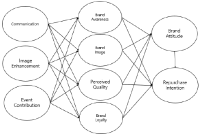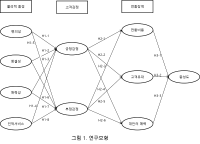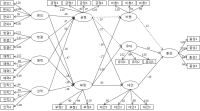
Purpose The purpose of this study was to provide title sponsorship marketing strategies by defining the relationship between professional volleyball title sponsorship, brand equity, brand attitude, and repurchase intention. Methods This study distributed 390 questionnaires to 2018-2019 V-League audiences and a total of 313 questionnaires were used as final validity sample. For data analysis, SPSS 21.0 and Amos 18.0 were used for frequency analysis, reliability analysis, confirmatory factor analysis, and structural equation analysis. Results First, title sponsorship had significant influence on brand equity, therefore hypothesis 1~3 were accepted, except for 1-3(perceived quality) and 1-4(brand loyalty). Second, among brand equity subfactors, hypothesis 4-1(brand awareness) and 4-4(brand loyalty) had significant influence on brand attitude which made hypothesis 4 partially accepted . Third, among brand equity subfactors, only brand image(hypothesis 5-2) had significant influence on repurchase intention which made hypothesis 5 partially accepted. Lastly, brand attitude had significant influence on repurchase intension, which made hypothesis 6 accepted. Conclusions It is anticipated that based on the result of the study, effective marketing strategy can be developed for title sponsorship companies in the future.


Purpose The purpose of this study is to identify the causal relationship between competitive strategy, absorption capacity and business performance of commercial fitness center and to confirm the control effect of absorption capacity between competitive strategy and business performance. Methods 330 fitness center managers and administrators were selected for the study. Out of 330, 308 questionnaires were collected and used for data analysis. The questionnaire consisted of confirmatory factor analysis, reliability analysis, correlation analysis and structural equation model analysis. Finally, Ping 's two - step approach was used to verify the moderate effect of absorptive capacity. Results The results of the study are as follows. First, competition strategy of fitness center has a positive effect on absorptive capacity. Second, the competition strategy of fitness center has a significant effect on business performance. Third, the absorptive capacity did not effect the management performance. Fourth, the absorptive capacity was found to be moderate effect between the competition strategy and the management performance of the fitness center. Conclusion Based on the results, the fitness center managers and administrators of fitness center should set up competitive strategy internally and increase absorptive capacity to utilize external information by internalizing it.


PURPOSE This study aimed to examine the mediating effect of psychological needs in the relationship between multiple coaching styles and teamwork among college football players. METHODS This cross-sectional study involved 526 elite football players. Descriptive statistics, reliability analysis, confirmatory factor analysis, correlation analysis, path analysis, and macroprocess were performed using statistical software to test the mediation effects of the data collected. RESULTS The findings suggested that autonomy-supportive and structure coaching styles positively correlated with and impacted psychological needs satisfaction and teamwork. Conversely, control and chaos coaching styles negatively correlated with and impacted psychological needs satisfaction and teamwork. In addition, autonomysupportive and structure coaching styles negatively correlated with and impacted psychological need frustration, while control and chaos styles positively correlated with and impacted psychological needs frustration. Furthermore, psychological needs satisfaction and frustration were found to partially mediate the relationships between autonomy support and teamwork, structure and teamwork, control styles and teamwork, and chaos styles and teamwork. CONCLUSIONS Autonomysupportive and structure coaching styles positively influenced teamwork by satisfying psychological needs. In contrast, control and chaos coaching styles negatively impacted teamwork by contributing to psychological needs frustration.
Purpose The purpose of this study was to analyze the relationship among emotional leadership, coach trust and athletic satisfaction of university. Methods 288 university soccer players were surveyed on the emotional leadership questionnaire, coach trust questionnaire and athletic satisfaction questionnaire through convenience sampling method. SPSS 23.0 and AMOS 23.0 were used to achieve the purpose of this study. Frequency analysis, confirmation factor analysis, reliability verification, correlation analysis and the structural equation model analysis were performed. Results First, emotional leadership had a positive effect on coach trust of university soccer players. Second, emotional leadership had a positive effect on athletic satisfaction of university soccer players. Third, coach trust had a positive effect on athletic satisfaction of university soccer players. Finally, coach trust mediated the relationship between emotional leadership and athletic satisfaction. Conclusions Emotional leadership was a leadership that can efficiently increase coach trust, and leaders must communicate with players through emotional effort and team operations with goals of athletic satisfaction and happiness rather than wins and losses were required.

The purpose of this study was to investigate the relationship between physical environment, customers' emotions, switching barriers and loyalty among water ski resort users in Gyeonggi-do and Gangwon-do province. Convenience sampling method was used, 277 of the questionnaires were selected as the ultimately valid sample. Data were analysed by SPSSWIN 18.0 and AMOS 18.0 program using frequency analysis, reliability analysis, correlation analysis, confirmatory Factor Analysis(CFA) structural equation model(SEM). The research findings are as follows. First, relations between physical environment and customers' emotions, attractiveness, cleanliness, convenience and human service had a significant positively impact on positive emotional response. convenience, attractiveness, human service, and cleanliness had a significant negatively impact on negative emotional response. Second, relations between customers' emotions and switching Barriers, positive emotional response did not have a significant impact on switching cost and interpersonal relationship, but positive emotional response had a significant impact on attractiveness of alternatives. negative emotional response had a significant impact on switching cost, interpersonal relationship and attractiveness of alternatives Third, relations between switching barriers and loyalty, switching cost did not have a significant impact on loyalty. but interpersonal relationship and attractiveness of alternatives had a significant impact on loyalty.


PURPOSE The purpose of this study was to investigate the effects of perceived organizational support of high school football players on innovative performance. Of particular note, we focused on examining the mediation effect of self-management between perceived organizational support and innovative performance. METHODS A total of surveys returned was 137 and the data used for the final analysis was 130. The data was processed using SPSS 21.0 statistical program and Lisrel 9.2 for confirmatory factor analysis. RESULTS The results of the analysis were as follows: first, perceived organizational support of high school football players had a positive effect on players’ self-management. Second, players’ self-management had a positive effect on players’ innovative performance. Third, players’ self-management fully mediated between perceived organizational support and players’ innovative performance. CONCLUSIONS The study concluded that maximizing both perceived organizational support and self-management of the high school football players are necessary in order for the organization to achieve high level of innovative performance.
PURPOSE This study aimed to subdivide the market based on the general characteristics and consumer psychology of sports brand collaboration consumers and provide basic data for efficient collaboration marketing activities of sports companies. METHODS The subjects of this study were high school, college, and graduate students from high schools and universities in the Seoul and Gyeonggi area. Of the 600 copies of the questionnaire distributed, 475 were selected and analyzed in the final sample. Regarding the statistical method for this study, the PASW 18.0 statistical program was used for the frequency, exploratory factor, reliability, hierarchical cluster, K-means clustering, and cross analyses, as well as the one-way ANOVA. RESULTS The results of the analysis suggested five subdivided clusters with according marketing strategies: “external male,” “practical male,” “twenties design preferred female,” “low-interest women,” and “high consumption optional attributes” groups.
The objective of this study was to examine the relationships among preferred and perceived leadership behavior, their congruence, and satisfaction with leadership based on Chelladurai's(1978) Multidimensional Model of Leadership(MML). To achieve the study objective, 210 professional dancers from 6 professional dance teams located in Seoul and the suburbs participated in this study. For hypotheses testing, descriptive statistics, hierarchical multiple regression analyses, and a confirmatory factor analysis using SPSS and AMOS were used. Results showed that the congruence between preferred and perceived leadership behavior did not have statistically significant influence on dancers satisfaction. The results of the study were inconsistent with what MML suggested. However, the results were quite consistent with empirical evidences of previous studies that investigated the influence of the congruence between preferred and perceived leadership on satisfaction.
PURPOSE This study aims to provide empirical foundational data for the development of a new profit model in Korean professional baseball. It does so by examining the influence of professional baseball NFT product attributes on customer perceptions of value, satisfaction, and purchase intention. METHODS Data were collected from consumers who have experience purchasing KBOLLECT. A total of 363 samples were collected for analysis. Surveys were utilized for data collection, encompassing 39 items that measured product characteristics, perceived value, satisfaction, purchase intention, and demographic information. Using the collected data, various statistical analyses were conducted including descriptive statistics, exploratory factor analysis, reliability analysis, correlation analysis and multiple regression using SPSS version 21. The ensuing results from the correlation analysis and multiple regression analysis are as follows. RESULTS Product features, including aesthetics, symbolism, and scarcity, had a positive impact on consumer’s perceived emotional value. Moreover, product features, encompassing aesthetics, symbolism, scarcity, and creativity played a significant role in enhancing consumer’s perceived economic value. Furthermore, product attributes such as aesthetics, symbolism, and creativity positively contributed to consumer’s perceived social value. Similarly, product features comprising aesthetics, scarcity, creativity, and symbolism positively affected consumer’s perceived intellectual value. Additionally, the research revealed that product features related to aesthetics, symbolism, creativity, and scarcity were instrumental in bolstering consumer. Importantly, these very attributes, including aesthetics, symbolism, scarcity, and creativity, exhibited a positive influence on consumers’ purchase intentions. CONCLUSIONS In conclusion, this study underscores the substantial impact of professional baseball NFT product characteristics on consumers’ perceptions, satisfaction, and purchase intentions. To maintain enduring relationships with consumers who engage with professional baseball NFT products, it is essential to fortify these product attributes and offer diverse services utilizing them.
PURPOSE For student-athletes to be able to successfully dedicate themselves to training and competition, the following key factors play an important role: The coach, team climate, and individual motivational characteristics. To test this hypothesis, the structural relationships between having a perceived autonomy support, a caring climate, basic psychological needs, and sport commitment were analyzed. METHODS Participants were 297 high school athletes registered with the Korea Olympic Committee (203 males, 94 females, Mage=17.88 years). Data were collected using sports climate questionnaires for autonomy support, caring climate scale, basic psychological needs scale, and sport commitment measurement. The collected data were analyzed using descriptive statistics, correlation analysis, and structural equation modeling. RESULTS The model’s fitness was indicated by x2/df=2.797 (x2=106.288, df=38), CFI=.977, TLI=.967, RMSEA=.078 (90% CI=.061, .096). Examining the various path coefficients revealed that coach autonomy support had a positive effect on the athlete’s caring climate, basic psychological needs, and sport commitment. The caring climate had a significant effect on basic psychological needs, but did not have a statistically significant effect on sport commitment. Finally, basic psychological needs had a positive effect on sport commitment. CONCLUSIONS Coach autonomy support fosters a caring climate, and athletes who are able to perceive this are able to dedicate themselves to their sport since their basic physiological needs are met. Therefore, coaches should use appropriate coaching strategies to enhance athletes' autonomy and foster a caring climate, as both are essential factors for meeting athletes' psychological needs and promoting sport commitment.